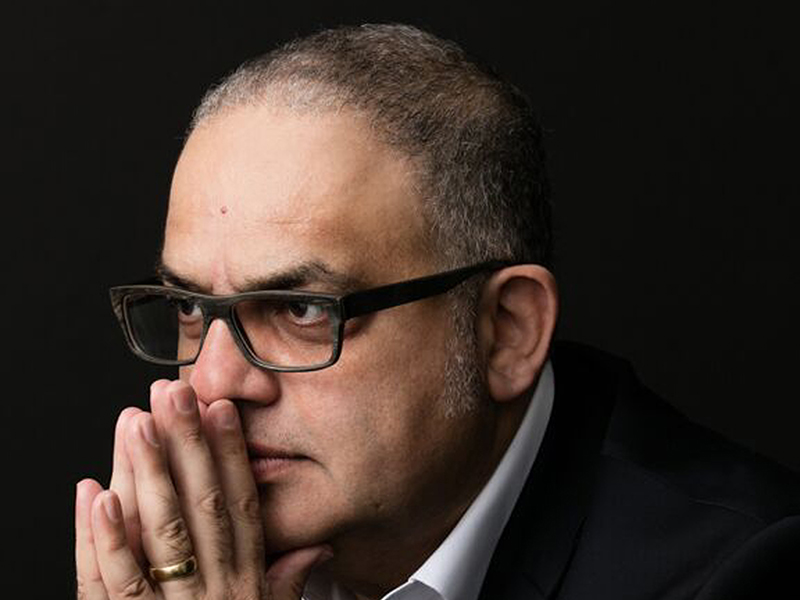When Ruby Namdar won the Sapir Prize for Literature, Israel’s most prestigious (and lucrative) literary award, in 2014 for The Ruined House, he was the first Israeli expatriate to receive the honour. Many in Israel objected, but not on the grounds that this profoundly Jewish novel did not deserve it.
Namdar faced no such controversy at the Blue Metropolis International Literary Festival in Montreal, which ended on April 29, where he was awarded the Literature Beyond the Borders certificate for his “contribution to the infinite variety of world literature.”
The Ruined House was recently translated into English by Hillel Halkin and is enjoying considerable acclaim. The New York Times praised it as “a masterpiece of modern religious literature.”
Born in Jerusalem in 1964 to Iranian parents, Namdar has been living in New York since 2000, mainly because he fell in love with an American, and teaches Judaic literature at Bard College and elsewhere. He worked for 10 years on The Ruined House, which is his second book.
READ: NOVEL IS AN INTRIGUING MIX OF MYSTERY AND HISTORY
Set at the turn of the millennium, the central character is Andrew Cohen, a 52-year-old professor of cultural studies at New York University, an elegant divorced man with expensive tastes, the usual academic ambitions at this stage of his career and an eye for his graduate students.
Cohen is thoroughly secular and American. He has not abandoned his Jewishness (the author’s choice of his name ensures that), but his relationship with Judaism is, at best, casual.
Cohen’s secure, well-ordered Manhattan life starts to unravel when he begins experiencing visual, auditory and olfactory hallucinations that are vivid, yet undefinable. They grow increasingly disturbing with their intimation of a celestial, yet grotesque, world. Eventually, Cohen completely breaks down.
The reader is let in on what’s going on at the end of each of the seven chapters (a significant number in Judaism). Pages of the Babylonian Talmud are reproduced with commentaries, surrounding a central story of the elaborate preparations of the high priest for entrance to “the Holy of Holies,” the inner sanctuary of the Temple – on one level, the ruined house.
This is not a moralistic tale. Cohen does not become a good Jew.
– Ruby Namdar
Just as the exalted religious figure reaches his apex, Cohen, the sinner, is descending to his nadir.
At Blue Metropolis, Namdar said his character’s eventual “redemption” should not be taken as him “finally seeing the light.… This is not a moralistic tale. Cohen does not become a good Jew, if you will. He has his epiphany in a very different place (than Jerusalem).”
The author says he did not expect to win the Sapir Prize because the novel is “subversive,” in that it runs counter to classic Zionism. “It is so Hebrew, so Jewish, yet Cohen has his epiphany on the banks of the Hudson, rather than in Israel.…
“For me to take Hebrew, which is more than a language, and take the Zionist project in the other direction – to the West – is a shanda to some people,” said Namdar, whose appearance at the festival was supported by the Israeli consulate.
Namdar may shock other Jews when he says that he believes the destruction of the Temple, even to this day, has more impact on Jewish identity than the Holocaust.
“The destruction of the Temple dwarfs the Holocaust,” he said. “There was not just mass murder and slaughter, but the destruction of the connection of a people with God and place. It was exile on so many levels, a sense of falling out of grace.”

As a consequence, he said, Jews “no longer felt like the Chosen People. From being proud sons and daughters of God, they became hated, prodigal vagabonds. Zionism was an over-reaction to this formative trauma.…
“Today, Jewish existence is all scar tissue covering a wound that never really healed. It’s why we are ill at ease at every moment, even the humour (disguises it). We are just not aware of it.”
Jews are so present in literary fiction – as writers, critics and so on – because it is “almost a new scripture. We now use words as an offering,” he said.
Namdar created Cohen as a proud regal figure, because, as a Jew, he prefers to identify with a king, however tragic, rather than a jester who uses clownishness to survive. It’s as if Cohen’s apparitions represent his royal Jewish DNA percolating up through the millennia.
“Today, Zionism is an important manifestation of Jewish culture, but only one. A meaningful Jewish life is possible outside Israel,” Namdar said.
